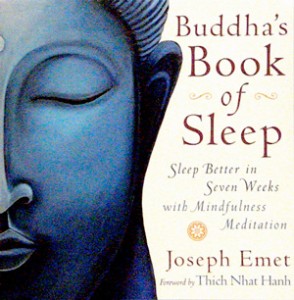
Excerpts from an interview with Joseph:
Q: What brought you to write this book?
Joseph: People have been asking about sleep difficulties in our groups till I realized how common this problem is. Mindfulness meditation has a good track record in helping with all sorts of things like stress, anxiety and depression. So, I started looking to see if it had anything to offer to people who did not sleep well. The more I looked, the more things I discovered, and slowly the book took shape.
Q: How does mindfulness meditation help?
Joseph: Well, we do not have to learn to sleep. Babies know how to sleep. So do cats and dogs. We only have to be aware of what we do that prevents us from sleeping, and stop doing that. Mindfulness is a good tool for becoming aware of what we do without conscious intention.
Q: What do we do that prevents us from sleeping?
Joseph: We think too much. And we don’t know how to stop. We can turn the light off in the bedroom, but there is no such one-click way to turn off the mind. We also tend to go over past issues such as a disagreeable conversation or an argument. Unfortunately our body does not know the difference between a real argument and an imagined or a replayed one. In both cases the heart beats faster, the blood pressure rises, the muscles tense up, and soon we are more ready for shadow boxing than we are for sleep!
Q: What is the connection between Mindfulness Meditation and sleep?
Joseph: There is a common element there. Calming the mind is the first step of Vipassana meditation. It is also a good way to get ready for sleep. Being in the here and now helps too. The body is in a quiet comfortable spot. But where is the mind? If it is somewhere else arguing a court case before a judge, that may not be so good for sleep!”
Buddha’s Book of Sleep has been translated into eleven languages and is the winner of the COVR award as the best self-help book of 2012.
